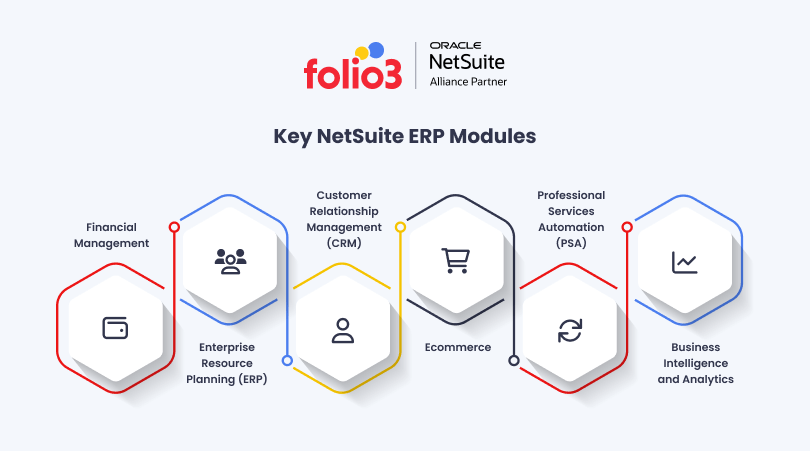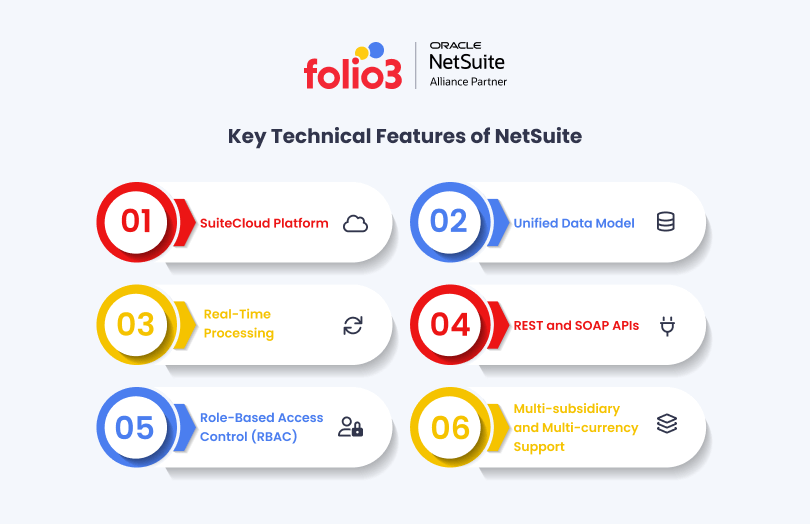NetSuite helps organizations (startups, SMBs, and enterprises) run smarter by bringing their finances, operations, sales, and customer data into one connected system.
The teams do not have to use multiple tools for each department, as it gives teams a single place to work, track progress, and make decisions with real-time data.
What is NetSuite?
NetSuite is enterprise-grade business management software and a cloud-based platform that provides a suite of applications to help businesses streamline their operations, enhance their performance, and drive more gains, and reduce costs as well.
It offers various platforms for customized business needs, such as SuiteCommerce, SuiteAnalytics, SuiteBuilder, and many others.
NetSuite is used by more than 420,000 organizations from all over the world.
If we talk about the NetSuite ERP system, it focuses on and manages core functions, including finance, accounting, inventory, orders, and documents.
It also has CRM functionalities. These functionalities extend to various departments such as sales, marketing, HR, performance management, payroll, and professional services automation (PSA).
In this blog, we give a complete overview of what does NetSuite do, its business models, core features, types of businesses that use it, and NetSuite implementation.
What business model does NetSuite use?
It uses a software as a Service (Saas) model in which the users/customers pay a subscription fee to access the technology, and they are not responsible for any underlying infrastructure, system, maintenance services, testing, and deployment patches.
It is scalable and cost-effective for startups, SMBs, and enterprises, as businesses can add custom functionalities as they need them.
For example, a B2B manufacturer can add a NetSuite eCommerce module after it decides to start their new online selling domain.
With NetSuite, you get visibility, control, real-time data information, and customization, which brings efficiency and agility to your business.
What Does NetSuite Do?
It helps companies run core business functions by leveraging a suite of applications like finance, HRM, CRM, ERP, supply chain management, and more, all on a single platform.
In the section below, we focus on the core tasks that you can seamlessly get done using NetSuite. However, before we start understanding what does NetSuite do, it is important to know that NetSuite by Oracle is available and sold in packages that are groups of dependent-specific features.
Top NetSuite Modules
The top NetSuite modules are made for core business processes such as financial management, ERP, CRM, eCommerce (SuiteCommrece), PSA, and business intelligence.

Let’s discuss the core NetSuite modules below.
1. Financial Management
As the name suggests, this module of NetSuite centralizes all the accounting processes.
It includes general ledger, accounts receivable and payable, fixed assets, tax management, and revenue recognition into one system.
Those who work in financial management can close books faster using NetSuite. Not only that, but they can also stay compliant with local and international accounting standards (like ASC 606 and IFRS 15) while having full visibility into financial performance.
The main features of NetSuite, like automated journal entries, multi-currency support, and built-in audit trails, reduce manual effort and bring accuracy across the board.

2. Enterprise Resource Planning (ERP)
Another one of the most important modules is its enterprise resource planning software that connects and automates core business functions like procurement, inventory, order management, production planning, and supply chain logistics.
Businesses that use NetSuite ERP can achieve real-time coordination between departments, which is critical for product-based companies managing multiple vendors, warehouses, and fulfillment channels.
Users can utilize built-in workflows and customizable approval chains.
NetSuite ERP streamlines complex processes, minimizes delays, and supports efficient resource planning across the organization.
3. Customer Relationship Management (CRM)
NetSuite includes a native CRM that gives businesses a complete 360-degree view of the customer lifecycle.
The CRM of NetSuite supports sales force automation, marketing campaign tracking, upselling/cross-selling, and case management.
NetSUite CRM is best for sales reps, marketing teams, and support agents.
They all work from a single source of truth, reducing data handoffs and increasing customer satisfaction through more personalized and responsive service.
4. Ecommerce (SuiteCommerce)
NetSuite offers an eCommerce platform that is known as SuiteCommerce.
By using it, businesses build and manage ecommerce storefronts directly within NetSuite.
It syncs all the data, such as product listings, pricing, inventory availability, promotions, and customer account data in real-time between the online store and the back-office system.
Speaking of the architecture, it has a unified architecture that makes sure that customers always see accurate stock levels and order history (online and in-store shopping).
It also supports mobile-friendly designs and B2B-specific features like tiered pricing and bulk ordering.
5. Professional Services Automation (PSA)
For services-based companies, NetSuite PSA provides full visibility into project delivery, resource allocation, and client billing.
Using NetSuite PSA, project managers can assign tasks, monitor budgets, and track time and expenses in real-time, while finance teams can automate billing cycles based on milestones or time-and-materials.
The tight integration with financials means businesses can accurately forecast revenue, improve utilization rates, and ensure projects are delivered on time and within scope.
6. Business Intelligence and Analytics
There is an analytics engine of NetSuite, i.e., SuiteAnalytics.
SuiteAnalytics gives users access to real-time dashboards, KPIs, saved searches, and custom reports, all without needing to export data or rely on IT. From drilling down from a profit margin chart into specific transaction details to building custom reports for board meetings, SuiteAnalytics helps everyone in the organization make smarter, faster decisions.
It also supports role-based dashboards so each team sees the insights most relevant to their function.
How Does NetSuite Work?
NetSuite is a multi-tenant, cloud-native ERP system that is built on Oracle’s SuiteCloud platform. Users can run it seamlessly in a browser, and all departments can interact using the unified data model in real-time.
The architecture of NetSuite ensures that users do not face data silos and transactions, records, and analytics flow across modules such as finance, CRM, inventory, and ecommerce without the need for manual integration.
It uses a rational database that has all the transactional and master data. NetSuite uses SuiteScript, which is JS JS-based API, SuiteFlow, which is used for visual automation, and SuiteBuilder for UI and schema customizations
Admins and developers can customize forms, fields, and processes without breaking compatibility across upgrades by using a version-safe customization layer.
All user actions are processed via role-based permissions, ensuring access controls are tightly enforced.
In addition to that, data is transmitted via encrypted channels (HTTPS) and processed in Oracle-managed data centers with high availability and compliance standards (e.g., SOC 1, SOC 2, ISO 27001).
Key Technical Features of NetSuite
The main features of NetSuite include SuiteCloud platform, unified data view, real-time processing, reporting and analytics, APIs, RBAC, and multi-currency support.

These features are explained below.
SuiteCloud Platform
It has customizable architecture that supports scripting (SuiteScript), workflows (SuiteFlow), integrations (SuiteTalk), and deployment (SuiteBundler).
Unified Data Model
With its unified data model, all the data is available in one place, and users can interact seamlessly. In this model, one schema supports finance, sales, inventory, and operations, reducing integration overhead and manual errors.
Real-Time Processing
NetSuite offers real-time processing, presenting data and reports that enable startups, small businesses, and enterprises to make decisions.
If the users make changes in one module (e.g., inventory depletion) instantly reflects in all relevant systems (e.g., accounting, order management).
REST and SOAP APIs
Sometimes there is a need for external integrations, and NetSuite does it all seamlessly.
It provides users with REST and SOAP web services for external integrations. Through these APIs, users can use third-party systems such as Shopify, Salesforce, or proprietary apps to create, read, update, and delete NetSuite records securely.
REST API is used for lightweight and modern applications. On the other hand, SOAP offers a more comprehensive interface with support for advanced data operations and metadata-driven services.
Middleware platforms like Celigo, Dell Boomi, or MuleSoft often work between NetSuite and external systems to manage data transformation.
Role-Based Access Control (RBAC)
NetSuite uses a robust RBAC system that defines what each user can see or do based on their assigned role.
Administrators can control access down to the field-level (e.g., restrict salary visibility to HR roles) and function-level (e.g., prevent junior finance staff from editing journal entries).
It is critical for compliance, especially in industries with regulatory oversight like healthcare, finance, or manufacturing.
Multi-subsidiary and Multi-currency Support
NetSuite offers OneWorld, a system that supports complex corporate structures that span countries, currencies, and tax regimes.
You can manage different subsidiaries within one account while maintaining separate books and local compliance.
In addition to that, transactions automatically convert between currencies using real-time exchange rates, and financial statements can be consolidated at regional or global levels.
The built-in capabilities of NetSuite reduce the need for external reporting tools or custom reconciliation scripts. It is ideal for multinational organizations with decentralized operations.
Types of Businesses that Use NetSuite
NetSuite is best for businesses of all sizes, from startups to small businesses and enterprises. It focuses on a wide range of industries such as retail, manufacturing, IT and software, financial services, and e-commerce.
Retail and eCommerce
NetSuite is one of the top SaaS platforms for retail, eCommerce, DTC brands, and multichannel sellers as it helps in centralizing inventory, order management, and customer data.
With SuiteCommerce, they can launch online stores, sync POS and backend systems, and keep real-time visibility across every sales channel.
Manufacturing and Distribution
Manufacturing companies and distributors track production processes, manage bills of materials, and streamline shop floor operations using NetSuite.
Distributors benefit from tight inventory controls, automated reorder points, and end-to-end supply chain management.
Software and Technology Companies
As per the reports shared by Statista, the revenue in the Enterprise Resource Planning Software market is estimated to reach US$55.88bn in 2025.
One of the key users of ERP software is SaaS and tech businesses.
These companies use NetSuite for recurring billing, usage-based pricing, and revenue recognition.
What does NetSuite do is that it simplifies GAAP compliance, tracks contract renewals, and connects sales activity directly with finance for full quote-to-cash visibility.
Professional Services
Businesses that offer professionally managed services, such as Agencies, consultancies, and service firms, use NetSuite.
It is used to manage client projects, assign resources, and automate time tracking and billing.
In addition to that, it also offers SuiteProjects for SMBs and enterprises. It gives clear profitability insights and improves utilization across teams.
Nonprofits and Education
In education and nonprofit organizations, there are certain financial processes such as fund accounting, donor management, and grant tracking. All of this is managed by NetSuite.
Educational institutions use it to manage tuition, budgeting, and operational reporting—all while staying compliant with financial oversight requirements.
Healthcare and Life Sciences
When it comes to healthcare, there are different kinds of regulations and compliances.
Healthcare suppliers, labs, and medtech firms use NetSuite to stay compliant with FDA and HIPAA regulations while managing product traceability, vendor records, and batch inventory across multiple locations.
Food and Beverage
NetSuite is best for food manufacturers and distributors to manage shelf-life tracking, lot control, recipes/formulations, and order fulfillment.
It’s especially valuable for companies that need to meet regulatory standards and manage perishable goods.
Wholesale and B2B Trade
Wholesalers rely on NetSuite for real-time inventory tracking, complex pricing models, and automated replenishment. Integrated CRM and ERP help them manage customer-specific orders and streamline sales operations.
Conclusion
NetSuite is a business platform, and it helps businesses globally to get a unified business view. Various sectors, such as retail, manufacturing, tech, managed services, non-profits, etc., are well managed by NetSuite.
The main benefits of NetSuite are data visibility, modular design, and industry-specific capabilities. Businesses of all sizes can control their operations, automate them, and also get scalability.
Implementing NetSuite
The process is lengthy and requires strategic planning. The main steps in NetSuite implementation include setting up and configuring the software according to business needs. It also includes data migration and user training.
This includes everything from setting up a chart of accounts and custom roles to configuring modules for finance, inventory, CRM, or e-commerce.
At Folio3, we specialize in full-cycle NetSuite implementation. We help you plan, customize, and implement a tailored solution that fits your business goals.
FAQs
What is the purpose of NetSuite?
The core purpose of NetSuite is to help businesses manage core functions like finance, inventory, sales, and operations in a unified cloud platform. It enables businesses to streamline processes and gives real-time visibility into performance.
What do people use NetSuite for?
Startups, SMBs, and enterprises use NetSuite for financial management, order processing, CRM, ERP, inventory control, eCommerce, analytics, reporting, and e-commerce.
What is NetSuite ERP used for?
It is used to run and manage different operations based on the business requirements, such as the general ledger, accounts, supply chain, and procurement. When businesses need real-time reporting and automation, NetSuite is the best software to leverage.
Is NetSuite a CRM or ERP?
It is an enterprise resource planning (ERP) management system, but it also has a built-in CRM. It means that businesses of all types can manage both customer relations and back-end operations within a single platform.
